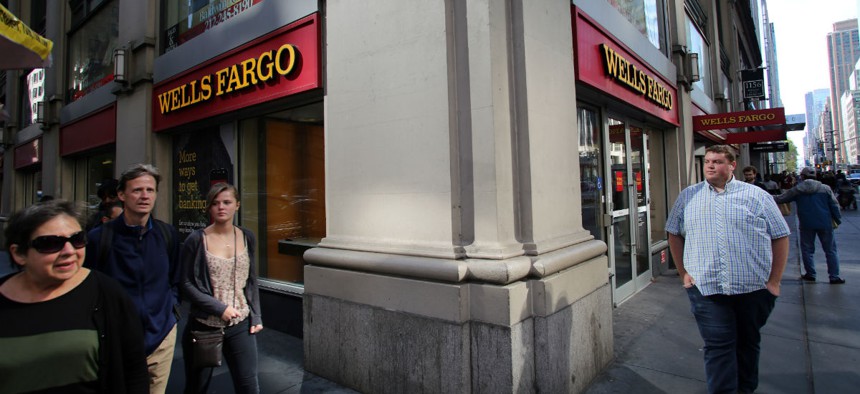
Pedestrians walk past a Wells Fargo branch in Manhattan in 2013. Northfoto/Shutterstock.com
Consumer Bureau Rebuffs Critics Who Deny It Broke Wells Fargo Scandal
Debate continues as bank execs see their hefty earnings clawed back.
Who deserves the credit for unmasking the Wells Fargo fraud debacle, under which bank executives pressured underlings to meet sales quotas by opening accounts customers didn’t authorize?
On Wednesday, the Consumer Financial Protection Bureau, which had unfurled the blockbuster story with its Sept. 8 announcement of a record $100 fine against Wells Fargo, told Government Executive that the government’s newest agency deserves credit for forcing the corporate abuses into the limelight.
But the agency’s self-congratulation is undeserved, according to some Republican senators and the editorial page of the Wall Street Journal, which must be counted among the critics who have long sought abolition of the agency created in the 2010 Dodd Frank post-recession re-regulation act.
Sen. Richard Shelby, R-Ala., chairman of the Banking, Housing and Urban Affairs Committee, at a Sept. 20 hearing said, “The 2013 Los Angeles Times articles led to the L.A. City Attorney's Office investigation into Wells Fargo's sales practices. Thousands of man-hours by a dozen dedicated L.A. city attorneys culminated in a lawsuit filed against Wells Fargo in May of 2015,” he said, as recounted by Cleveland.com. “This timeline begs the question: Where were the federal regulators during those years?"
Responded Sen. Chuck Schumer, D-N.Y., “This case exemplifies why the CFPB was created.”
The Journal mocked Schumer for spending “much of Tuesday lauding the gumshoes at the Consumer Financial Protection Bureau, as if they had cracked the case. But Los Angeles City Attorney Michael Feuer says it was a Los Angeles Times story about the unauthorized accounts in December 2013 that triggered his investigation—years after the bank started firing people for misconduct. Mr. Feuer’s deputy told Senators the city was already discussing a settlement with the bank when the feds joined the negotiations.”
The bureau itself is sticking to its guns. “As the director has said, the bureau received whistleblower tips related to sales practices at Wells Fargo in the summer of 2013, before the LA Times published its October or December 2013 articles,” spokesman David Mayoraga told Government Executive. “The CFPB did not go public with its findings until we issued our order on Sept. 8, 2016.
That Sept. 8 release announced the $100 million fine, plus more being imposed by other federal agencies after 5,300 bank employees had been terminated for participating in the fraudulent sales. “Wells Fargo employees secretly opened unauthorized accounts to hit sales targets and receive bonuses,” wrote CFPB blogger Jeff Ehrlich. “Because of the severity of these violations, Wells Fargo is paying the largest penalty the CFPB has ever imposed. Today’s action should serve notice to the entire industry that financial incentive programs, if not monitored carefully, carry serious risks that can have serious legal consequences."
On Sept. 27, the company itself announced that CEO and chairman John Stumpf will forfeit $41 million in unvested stock, give up his $2.8 million annual salary (temporarily) and get no bonus this year. Wells Fargo’s board also announced that Carrie Tolstedt, the executive responsible for the fraud-plagued sales unit, is departing, effective immediately, accelerating her retirement date from the end of this year. She also gets no severance pay or bonus for this year, gives up $19 million in stock and any “retirement enhancements.”
Image via Northfoto/Shutterstock.com.







